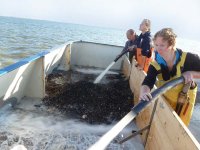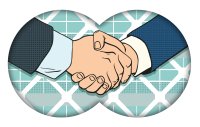Illustrations: Geert-Jan Bruins Photos: Wageningen University and Research
Wageningen Research is facing heavy weather. Raoul Bino, Director of the Agrotechnology and Food Sciences group, makes no bones about it. The number of government research assignments has dropped by tens of percent, the competition from other Dutch and European institutes and universities has increased, and the rules for research funding have become more complicated. The research institutes’ turnover and results are falling. ‘And our freedom to formulate research projects ourselves is declining too,’ says Bino. ‘We are eating into our intellectual capital.’
In an effort to reverse that trend, a working group led by Bino is thinking through a new strategy. ‘We need to get the time and space back to invest in knowledge development ourselves again,’ says Bino. And that can only be achieved if the organization changes. ‘We should no longer look only to our clients and network for research projects, and we should start thinking in broader terms as Wageningen Research. The thing is to try to build up strategic collaboration with businesses, ministries and provinces, to discuss your vision and plans together, to make sure you understand each other’s expertise and issues, and – where necessary – to bring other parties on board to address the issues. Don’t be defensive about your knowledge, put your cards on the table. This is not about just one project but about how we can collaborate for the next five years.’
New business model 1: Regional station
Shellfish research at Wageningen Marine Research in Yerseke in Zeeland very nearly bit the dust, but at the eleventh hour in the spring of 2016 the possibility came up for funding a slimmed-down version of the programme. The new Regiostation for the shellfish sector was born.

The Zeeland shellfish sector and regional government have allocated around half a million euros per year to the station for the next five years, and have made deals with Marine Research about a completely new organizational structure and management. In the past, researchers and clients negotiated the research projects, after which the researchers carried them out at an hourly rate and sent in their bill. Now there is a pot of money and researchers and clients discuss how to spend it in working groups. Marine Research has also set up a helpdesk for the shellfish sector, where fishers and fish farmers can bring their questions, free of charge and without a project necessarily coming out of it. Nor do researchers and fishers charge each other any more for joining trips on each other’s boats.
‘It is a new way of working together,’ says researcher Aad Smaal of Marine Research. He is positive about it. ‘It gives everyone some peace of mind because there is more security for the researchers and the clients can directly see what happens with their money.’
New mix
Wageningen Research has three kinds of clients, Bino explains. ‘There is government, particularly the ministry of Economic Affairs. Then there are the public-private projects such as the EU ones. And thirdly, there is industry. All together this should be able to generate a healthy turnover, with which the institutes can maintain their knowledge base.’ But this does require new business models, because the knowledge base funding from Economic Affairs has been cut back over the past few years, and the product boards, with their joint research agendas and budgets, have been closed down. So new forms of collaboration need to be established, with new partners and new rules of play. The first successful examples can already be seen (see boxes).

Wageningen Food & Biobased Research, the institute Bino heads, is managing quite well to get positive results with a new mix of research assignments. The institute is even in a position to invest in a new facility for post-harvest research. Bino: ‘The shelf life of fruit post-harvest is an important issue, and we expect a growing number of research assignments. We have made a business plan and as a management team, we have said: we have the confidence to invest in this. You would like that to be possible more often in Wageningen Research. You need that kind of freedom as a research organization.’
A united front
But will this be feasible for the Wageningen research in the field of nature and environment, which is currently running at a loss? Bino: ‘I think those researchers could develop new business with partners from industry too. Companies are investing in the circular economy and they want to deal with their environment sustainably. With a shared vision on the research context, and with sound project management in place, the environmental researchers can establish strategic collaboration with companies too.’
‘We mustn’t keep our networks to ourselves but help each other’
What helps when exploring the market, says Bino, is for business unit managers not just to call in on companies on their own behalf, but to present a united front. ‘We must be more strategic, and ask ourselves: which would be the best business unit to approach this client? We mustn’t keep our networks to ourselves, we must help each other.’
And what should we avoid doing? ‘We mustn’t try to undercut others with low rates and we mustn’t do anything we are not good at. Either you are the expert or you bring in an expert from another science group. You’ve got to think in a new way, from the market’s point of view.’
New business model 2: Club of 100
Wageningen Plant Research has started a ‘club of 100’: a collaborative network for suppliers in Dutch greenhouse horticulture. For a fee of 15,000 euros per year, members of the club get easy access to the Greenhouse Horticulture business unit’s expertise. ‘Half the fee gives them the right to commission short-term experiments or calculations from us, as well as exchange ideas about innovation and have strategic discussions,’ says business unit manager Sjaak Bakker. The other half of the membership fee goes towards joint projects. ‘It is accessible and they can ask any questions they like. There aren’t any difficult contract negotiations. And if we don’t know the answer ourselves we bring in a WUR specialist from another department.’
The club now has 65 members who bring in a million in research funding between them. They set the research agenda. This means getting the sometimes competing companies on the same page. Once that is the case, it is the researchers’ job to work out the project with a supervisory group, and to implement it for a fee agreed with the members, paid from the joint kitty. Bakker: ‘The great advantage is that you make people part of your organization. You go for a long-term relationship.’

Bakker sees another promising business model too. ‘Nowadays we do consultancy jobs for countries that want to develop high quality research facilities for greenhouse horticulture. That is lucrative because, besides our unique knowledge of the research in that field, we have the greenhouse facilities to go with it. So you sell that knowledge, and then you get a strong international research partner into the bargain. What is more, it gives you an incentive to stay at the top.’
New business model 3: Agro & Food Portal
Wageningen Economic Research provides economic information and research results on the online portal Agrimatie. This national database on the agriculture sector is usually maintained with funding from the ministry of Economic Affairs. Lower levels of government can also be interested in this data, however, insofar as they apply to their region. For example if the province of Brabant wants to know how fast the number of pig farms is going down, it can pay for information from the Agrimatie database. In this case the fee the province pays covers not just the researchers’ time, says programme manager Arjen Daane, but also some of the technical costs and model development. The extra income enables Wageningen Economic Research to invest in new products.
 Daane would also like to provide information from Agrimatie to businesses. If, for example, his institute does an exploratory study for the Organization for Economic Cooperation and Development (OECD)
Daane would also like to provide information from Agrimatie to businesses. If, for example, his institute does an exploratory study for the Organization for Economic Cooperation and Development (OECD)
on projected developments in the European dairy sector, this could generate strategic information that companies would be interested in buying. In such cases too, the institute should charge the company for part of the data and development costs, argues Daane, to create room for investment by the institute. You could also look for a strategic partner in this. Economic Research has plans, for example, to collaborate with a bank or a consultancy firm, with the institute generating the knowledge and the partner disseminating it.
